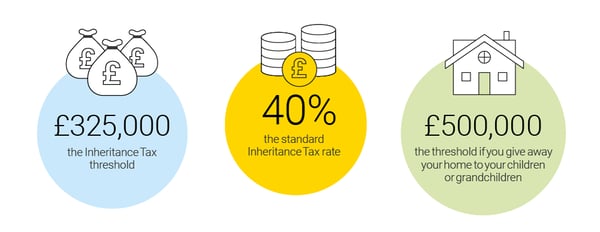Life insurance and tax
Managing your money can get complicated, but there are certain myths surrounding a ‘tax on life insurance’, and whether life insurance is tax deductible, that we wanted to dispel in this guide. So, read on for more information on tax and life insurance.

Do I have to pay taxes on life insurance?
While there is no specific tax on life insurance, either when you buy or in the event of a valid death claim, the value of your life insurance policy may be subject to Inheritance Tax if it forms part of your estate.
Are life insurance premiums tax deductible?
Most life insurance policies are excluded from the current UK Income Tax regime. The amount you pay for personal life insurance (also known as the premium) is not tax deductible, but in the event of a valid claim the cash sum will not be subject to Income Tax.
What is inheritance tax?
Inheritance Tax (IHT) is a tax on the estate (the property, money, assets and possessions) of the deceased person’s estate after all other debts and funeral expenses have been deducted.
IHT threshold and rates 2024-2025
Everyone in the 2024-2025 tax year has a tax-free inheritance tax allowance of £325,000 This is usually referred to as the nil-rate band. The allowance has remained the same since 2010-11.
The standard inheritance tax rate is 40% of anything in your estate over the £325,000 threshold.
For example, Mr. Jones left behind an estate worth £500,000, the tax bill will be £70,000 (40% on £175,000 – the difference between £500,000 and £325,000).
If the value of their estate is below £325,000 threshold there’s normally no Inheritance Tax to pay however your personal legal presentative will still need to report it to HMRC.
For married couples or civil partners, they can leave more than this before paying tax.
From April 2017, you can also pay less inheritance tax if you're leaving property to a family member. This could be your children (including adopted, foster or stepchildren) or grandchildren. For the 2022-23 tax year, this new transferable allowance rose to £175,000, up from £150,000 in 2019-20.

Can I give money away to avoid inheritance tax?
As mentioned, if your estate is worth more than £325,000 (or £650,000 for married couples and civil partners), then there will be an inheritance tax liability.
You're allowed to make some gifts without any tax being due after your death. These usually include gifts to your spouse or civil partner, or if you'd like to leave money to a charity.
One way of reducing your inheritance tax liability would be in giving assets away while you are still alive. You can give up to £3,000 in total in each tax year that you're alive.
You can carry any unused part forward one year only to the next year (so if you didn't use this allowance last year you could give away a total of £6,000). This gift is technically called your 'annual exemption'.
A married or civil partner can give away £6,000 each and potentially £12,000 if they didn't use their exemption from the previous tax. You're also allowed to make unlimited gifts of up to £250 to others in any one tax year.
You can make gifts in consideration of marriage or civil partnership up to £1,000; in addition to this you can also give up to £2,500 to grandchildren, and £5,000 to your children. These gifts must be made before the wedding or civil partnership - however, it is important that the wedding goes ahead following this, else it could be classed as exempt transfers.
If you make gifts over your annual exemption it would also include gifts to individuals made more than seven years before your death.
If you make a gift within seven years of your death, it may be included in your estate for inheritance tax purposes. This can be reduced by using taper relief on the gift made.
Will I pay tax on a Critical Illness Cover pay-out?
The value on a valid critical illness claim will not form part of the estate, unless you are diagnosed with or undergo a medical procedure for one of the specified critical illnesses we cover, and you survive 14 days from diagnosis, then the policy may pay out after you die. In which case, the amount of cover will be payable to your estate and may be subject to Inheritance Tax, above £325,000. The same is true for a valid terminal illness claim.
Putting your life insurance ‘in trust’
Another option is to put your life insurance 'in trust'; this is a legal arrangement that lets you leave assets to friends, family or whoever you choose to be your beneficiary, and will not be considered part of your estate so should not be subject to tax on the value of your life insurance.
We have put together a helpful article with further information on putting life insurance in trust detailing the ways you can benefit from taking this popular option.






